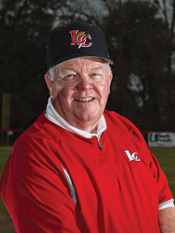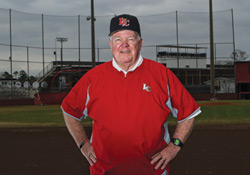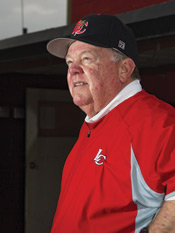 People define success in a number of different ways. In the case of Rob Williams, Lee County’s athletic director and former head baseball and assistant football coach, it doesn’t matter how you choose to do so. He has had a long and successful career filled with region championships, appearances in the state playoffs, and some oh-so-close moments in the state finals. His numbers in baseball are impressive – in 24 years as head baseball coach, his teams won 14 region championships, went to the Final Four three times, and the state finals twice (the Trojans were runners-up in 1990 and 2005). In the process, he helped develop thousands of young men into productive, responsible adults and produced one National League Rookie of the Year, National League batting champ, and a two-time World Series champion in Buster Posey.
People define success in a number of different ways. In the case of Rob Williams, Lee County’s athletic director and former head baseball and assistant football coach, it doesn’t matter how you choose to do so. He has had a long and successful career filled with region championships, appearances in the state playoffs, and some oh-so-close moments in the state finals. His numbers in baseball are impressive – in 24 years as head baseball coach, his teams won 14 region championships, went to the Final Four three times, and the state finals twice (the Trojans were runners-up in 1990 and 2005). In the process, he helped develop thousands of young men into productive, responsible adults and produced one National League Rookie of the Year, National League batting champ, and a two-time World Series champion in Buster Posey.
Williams graduated from Ware County High School, where he played football and baseball. After high school, he attended then-Valdosta State College, where he played two years of baseball at VSC. When he finished at Valdosta State, he took his first job at Colquitt County High. Back then, it was known as Moultrie High School. “Yeah, I’m an old guy,” he laughs. He went to Moultrie in 1976 and stayed there until 1984, when he moved to Lee County. Williams had coached with Doug Tucker at Moultrie/Colquitt County. In 1984, Tucker took the head football job at Lee County and asked Williams to move to Leesburg with him.
 Initially, Williams was an assistant football and baseball coach. When he went to Lee County, the Trojans baseball team was struggling a bit but they had won some games. For the first few years, he coached under then-head coach Butch Watts and the team improved. Success came quickly once Williams took over in 1989. In his first four years as head baseball coach, the Trojans won 100 games, four region titles, and went to the Final Four and the state finals once. “Baseball was really good in this area at that time. You had to do really well just to get into the playoffs. You had to win the region to move on,” he says.
Initially, Williams was an assistant football and baseball coach. When he went to Lee County, the Trojans baseball team was struggling a bit but they had won some games. For the first few years, he coached under then-head coach Butch Watts and the team improved. Success came quickly once Williams took over in 1989. In his first four years as head baseball coach, the Trojans won 100 games, four region titles, and went to the Final Four and the state finals once. “Baseball was really good in this area at that time. You had to do really well just to get into the playoffs. You had to win the region to move on,” he says.
It didn’t take his players long to expect the best from themselves. “They felt like they were supposed to win. Even if we got out to a slow start and fell behind early, our players felt like they would come back and win. At the end of the game, they knew they would be there with the lead. Anything short of that wasn’t acceptable,” says Williams. He taught his players to give everything they had. They played hard and they played fast. Williams built his teams around solid pitching and airtight defense. “My father taught me that it doesn’t take any ability to hustle. You run out every play and play hard. If we could pitch and play defense, we wouldn’t have to be an offensive juggernaut. We had some teams that scored a lot of runs but we didn’t worry about the long ball. We just wanted to put the ball in play and put pressure on our opponent’s defense,” he says.
Williams baseball and the athletes who play it evolve over the course of his career. When he started coaching, baseball was an afterthought at most high schools. Coaches might not have had any baseball experience and facilities often left a great deal to be desired. After a few years in the game, he looked around and realized that all the teams were starting to get excellent coaches. There was a greater emphasis on baseball at the high school level, and that opened up greater opportunities for coaches and players to move on to the next level. “We had to pay more attention to the details. We had to start paying attention to the little things. We realized if we did that, the big things would take care of themselves,” he says.
 The game has changed yet again, though this time it may have taken a step back in time – at least from a strategy standpoint. With the advent of aluminum bats, momentum began shifting in favor of the hitters. As bat technology improved, pitchers found themselves increasingly at a disadvantage. Then, a couple of years ago, when governing bodies in both high school and college altered bats to where they more closely resembled wooden bats, coaches had to adapt. It forced changes in strategy and it changed the way coaches taught hitting. “We had to teach hitters to use their hands more. We also had to go back to small ball. We did more bunting for base hits, hit and run, trying to steal runs wherever we could. It put a greater emphasis on base running. It also changed the way defenses played, too,” he says.
The game has changed yet again, though this time it may have taken a step back in time – at least from a strategy standpoint. With the advent of aluminum bats, momentum began shifting in favor of the hitters. As bat technology improved, pitchers found themselves increasingly at a disadvantage. Then, a couple of years ago, when governing bodies in both high school and college altered bats to where they more closely resembled wooden bats, coaches had to adapt. It forced changes in strategy and it changed the way coaches taught hitting. “We had to teach hitters to use their hands more. We also had to go back to small ball. We did more bunting for base hits, hit and run, trying to steal runs wherever we could. It put a greater emphasis on base running. It also changed the way defenses played, too,” he says.
Twelve years ago, Williams added athletic director to his list of duties at Lee County. After last baseball season, he felt as though the grind had gotten too much. It was time to step away. “I could feel it. I didn’t ever want to get to where I dreaded going on to the field. I just felt as though I didn’t have the energy to devote to baseball that these kids deserve,” he says. Now that he isn’t coaching baseball, he has more time to devote to the other sports at Lee County High – no small task given the Trojans’ recent move to Region 1-6A. “Athletics is an extension of a student’s education. It’s just like any other class. Kids learn so many lessons in athletics that they can apply in other areas of life. High school athletics isn’t going anywhere but we have to make sure the kids enjoy what they do. There are a lot more things out there that kids these days can do besides play sports,” he says.
Throughout his coaching career, Rob Williams’s wife of 33 years, Sharron, has been by his side. It hasn’t always been easy but she has supported him all the way. Consider for a moment how their marriage began: They married on August 30, the day after a football game in which Williams had to coach. Because of the game, they couldn’t have their rehearsal on Friday night. So they had their rehearsal on Thursday, he coached on Friday, then they married on Saturday. The following Tuesday, he was back at football practice. “I remember that we won that game, 11-6,” he laughs. His daughters Melissa, Michelle, and Mellanie were all with him on the sidelines keeping stats for the team when they were in high school. “That gave me the chance to spend some extra time with them.”
Coach’s Corner/South Georgia/March 2014
Rob Williams
Lee County High School
Leesburg, Georgia
Robert Preston Jr.
Photography: Micki K. Photography
Former Lee County baseball coach, current athletic director reflects on successful career












